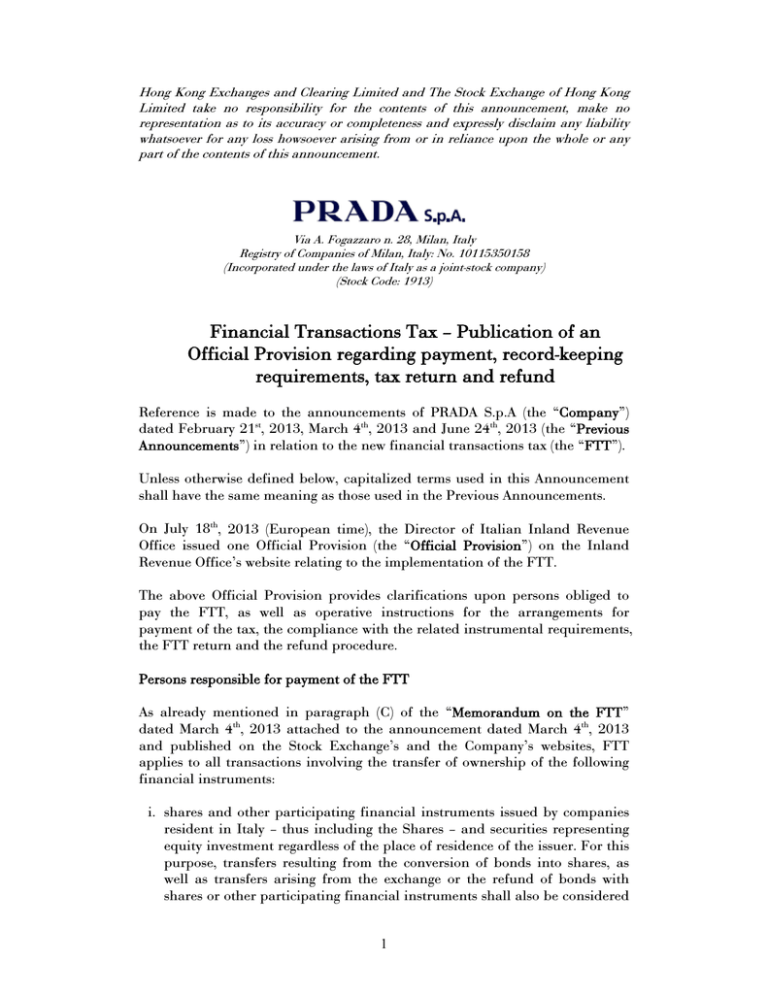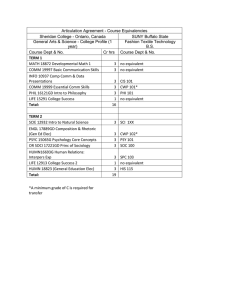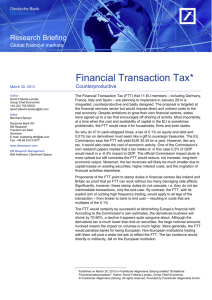Financial Transactions Tax – Publication of an Official Provision
advertisement

Hong Kong Exchanges and Clearing Limited and The Stock Exchange of Hong Kong Limited take no responsibility for the contents of this announcement, make no representation as to its accuracy or completeness and expressly disclaim any liability whatsoever for any loss howsoever arising from or in reliance upon the whole or any part of the contents of this announcement. Via A. Fogazzaro n. 28, Milan, Italy Registry of Companies of Milan, Italy: No. 10115350158 (Incorporated under the laws of Italy as a joint-stock company) (Stock Code: 1913) Financial Transactions Tax – Publication of an Official Provision regarding payment, record-keeping requirements, tax return and refund Reference is made to the announcements of PRADA S.p.A (the “Company”) dated February 21st, 2013, March 4th, 2013 and June 24th, 2013 (the “Previous Announcements”) in relation to the new financial transactions tax (the “FTT”). Unless otherwise defined below, capitalized terms used in this Announcement shall have the same meaning as those used in the Previous Announcements. On July 18th, 2013 (European time), the Director of Italian Inland Revenue Office issued one Official Provision (the “Official Provision”) on the Inland Revenue Office’s website relating to the implementation of the FTT. The above Official Provision provides clarifications upon persons obliged to pay the FTT, as well as operative instructions for the arrangements for payment of the tax, the compliance with the related instrumental requirements, the FTT return and the refund procedure. Persons responsible for payment of the FTT As already mentioned in paragraph (C) of the “Memorandum on the FTT” dated March 4th, 2013 attached to the announcement dated March 4th, 2013 and published on the Stock Exchange’s and the Company’s websites, FTT applies to all transactions involving the transfer of ownership of the following financial instruments: i. shares and other participating financial instruments issued by companies resident in Italy – thus including the Shares – and securities representing equity investment regardless of the place of residence of the issuer. For this purpose, transfers resulting from the conversion of bonds into shares, as well as transfers arising from the exchange or the refund of bonds with shares or other participating financial instruments shall also be considered 1 as transfers of ownership of shares or other participating financial instruments; ii. financial derivatives and transferable securities provided that the underlying or reference value consists for more than 50% of the market value of the instruments referred to point i) above; iii. transactions executed on the Italian financial market deemed to be “Highfrequency Trading” referred to financial instruments under points i) and ii) above. Under article 1 of the Official Provision, the following persons are responsible for payment of the FTT due upon the above transactions: banks, financial intermediaries, and any other persons, including those non-residents in Italy, that are authorized in their country of residence to professionally act towards the public for providing services and investment activities that can be assimilated to those specified under article 1, paragraph 5, lett. a) (dealing for own account), lett. b) (execution of orders for clients) and lett. e) (reception and transmission of orders) of the Consolidated Law on Financial Intermediation referred to in Legislative decree n. 58 of 24 February 1998 (“TUF”), with the exclusion of activities consisting in placing two or more investors into contact, thereby making it possible to conclude transactions, performed by independent brokers who are not connected or related to those investors by way of collaboration, employment or agency. Under article 2.1 of the Official Provision, the following persons are also responsible for payment of the FTT due upon transactions under points i) and ii) above: financial intermediaries qualified for providing collective asset or portfolio management services, including those non-residents in Italy that are qualified in their country of residence for providing services that can be assimilated to those specified under article 1, paragraph 5, lett. g) (portfolio management services) and article 1, paragraph 1, lett. n) (collective asset services) of TUF for the transactions performed among such activity, unless those financial intermediaries avail themselves of another person obliged to pay the FTT for the execution of the orders of negotiation; trusts, including those non-residents in Italy authorized in their country of residence to the practise of activities that can be assimilated to property management on behalf of third parties as defined under article 1 of Law n. 1966 of 23 November 1939, unless those trusts avail themselves of another person obliged to pay the FTT for the execution of the orders of negotiation, or the settler certifies that the FTT due for such transaction has been already applied; notaries involved in the drawing up or authentication of deeds concerning the same transactions, including those acting outside of Italy, unless the taxpayer certifies that the FTT has been already applied. For transactions performed through deeds drawn up or authenticated outside of Italy and 2 submitted to a notary acting in Italy, the FTT must be paid by the latter, unless the taxpayer certifies that the FTT has been already applied. Under article 2.2 of the Official Provision, if no financial intermediary is involved in the transfer of the Shares, the ultimate purchaser is required to make the payment of the FTT. Obligation of payment and other obligations deriving from the application of the FTT Law General rules Under article 3.1.1 of the Official Provision, financial intermediaries and other persons who are involved in the execution of the transactions referred to in articles 1 and 2.1 of the Official Provision shall not pay the FTT if the taxpayer has certified in writing that the transaction falls within the exclusion cases set forth by article 15 of the ministerial decree relating to the implementation of the FTT published in the gazette by the Ministry of Economy and Finance on February, 28th 2013 (the “Ministerial Decree”) or within the exemption cases set forth by article 16 of the same Ministerial Decree and they are not in the position to know, based on ordinary diligence, that the taxpayer’s certification is false or not reliable. Notwithstanding the above, under article 3.1.2 of the Official Provision, financial intermediaries and other persons who are involved in the execution of the transactions are allowed not to request the above taxpayer’s certification when the exclusion or exemption cases can be verified based on the technical nature of the transaction or the information publicly available or information available to the financial intermediary through its own anti money- laundering compliance procedures; in such event, the financial intermediaries are responsible in cases of negligence, inexperience or imprudence. For details on exclusion and exemption cases, please refer to paragraph (H) of the Memorandum on the FTT. Countries or territories with agreements for the purposes of the exchange of information or the assistance in the collection of tax credits In the case where there are more than one financial intermediary involved in the execution of the transaction, the obligation to pay the FTT falls on the intermediary that directly receives the transaction(s) order from the ultimate purchaser (i.e. the beneficial owners). In this latter case, if the purchaser or final counterparty of the order of execution is a financial intermediary or other person involved in the execution of the transaction(s) which is located in a country or territory with which Italy has agreements in force for the purposes of the exchange of information or the assistance in the collection of tax credits (as identified in the specific Provisions dated March, 1st 2013 and March, 29th 2013 issued by the Director of the 3 Italian Inland Revenue Office – please note that Hong Kong is not included in such list), such person shall pay directly the FTT due. In order to comply with the requirements resulting from the application of the FTT, the above financial intermediaries shall, alternatively: 1. comply with the requirements through a permanent establishment located in Italy pursuant to article 162 of the Consolidated Act on Income Taxes referred to in Presidential decree n. 917 of 22 December 1986 (“TUIR”), irrespective of the place of execution of the transactions (see article 4.1.1 – point I) of the Official Provision); or 2. appoint for a fiscal representative in Italy, in the case they do not have a permanent establishment in Italy pursuant to article 162 of TUIR (see article 4.1.2 of the Official Provision); or 3. register themselves directly requesting for the attribution of an Italian tax code, in the case they do not have a permanent establishment in Italy pursuant to article 162 of TUIR and do not appoint a fiscal representative in Italy (see article 4.1.4 of the Official Provision). Countries or territories without agreements for the purposes of the exchange of information or the assistance in the collection of tax credits As already set by article 19 of the Ministerial Decree, the Official Provision states that if the financial intermediary or other person involved for any reason in the execution of the transaction(s) is located in a country or territory with which Italy has no agreements in force for the purposes of the exchange of information or the assistance in the collection of tax credits, it shall be considered for all effects as purchaser or final counterparty of the order of execution; in such a case, the net balance of the transactions regulated daily shall be calculated separately for each beneficial owner. Nevertheless, the financial intermediary or other person located in a country or territory with which Italy has no agreements in force for the purposes of the exchange of information or the assistance in the collection of tax credits shall not be considered as purchaser or final counterparty of the order of execution should the following (alternative) events occur: if the financial intermediary has a permanent establishment in Italy pursuant to article 162 of TUIR, it shall comply with the fulfillments deriving from the application of the FTT, irrespective of the place of execution of the transactions, through said permanent establishment (see article 4.1.1 – point II) of the Official Provision). The above Italian permanent establishment must file to the e-mail address of the Italian Inland Revenue Office – Centro Operativo di Pescara (entrate.ftt@agenziaentrate.it) the form attached under number 2 to the Official Provision, providing some identification data of its head-office 4 (name, territory of residence, e-mail address) that will be published on the Italian Inland Revenue Office’s website within ten days from receipt; or if the financial intermediary has a permanent establishment in a country or territory with which Italy has agreements in force for the purposes of the exchange of information or the assistance in the collection of tax credits, such permanent establishment may register itself directly in Italy (requesting for the attribution of an Italian tax code) bound to comply with payment, declaration and registration requirements for transactions irrespective of their place of execution (see article 3.1.7 of the Official Provision). The above permanent establishment must file the form attached under number 1 to the Official Provision, in order to provide some identification data that will be published on the Italian Inland Revenue Office’s website within ten days from receipt and assume the aforesaid commitment; or if the financial intermediary does not have a permanent establishment in Italy pursuant to article 162 of TUIR or has a permanent establishment in a country or territory with which Italy has agreements in force for the purposes of the exchange of information or the assistance in the collection of tax credits but does not wish to avail itself of such permanent establishment for the fulfillments described in the previous point, the financial intermediary can, alternatively (see article 4.1.5 of the Official Provision): 1. appoint as fiscal representative one of those intermediaries under article 1 or 2.1, lett. b) of the Official Provision resident in Italy or having a permanent establishment in Italy; the latter shall file to the e-mail address of the Italian Inland Revenue Office – Centro Operativo di Pescara (entrate.ftt@agenziaentrate.it) the form attached under number 3 to the Official Provision, providing some identification data of the representative itself and of the intermediary represented that will be published on the Italian Inland Revenue Office’s website within ten days from receipt (see article 4.1.5 – point I) of the Official Provision); or 2. i) apply for an Italian tax code, ii) assume the commitment to answer, within 30 days from receipt, to the requests of information coming from the Italian Inland Revenue Office (by filing the form attached under number 4 to the Official Provision, containing also some identification items), iii) grant a proxy to the Italian Centralized Management Company identified under article 80 of TUF for the assistance in FTT payment and declaration fulfillments and iv) file each month (by the 16th day of the month following the transaction) to said Centralized Management Company the relevant information upon the transactions executed (filing a form compliant with the forms attached under numbers 5, 6 and 7 to the Official Provision) together with the amount of tax that the Centralized Management Company will take care to pay to the Italian Inland Revenue Office (see article 4.1.5 – point II) of the Official Provision). The identification data (name, territory of residence, 5 e-mail address) of the non-resident intermediary will be published on the Italian Inland Revenue Office’s website within ten days from receipt. It is noted that under article 3.1.6 of the Official Provision, non-resident persons referred to in article 1 of the same Official Provision are considered resident in a country or territory having reference to their own registered office, except from cases in which they have a permanent establishment in Italy pursuant to article 162 of TUIR or a permanent establishment in a country or territory with which Italy has agreements in force for the purposes of the exchange of information or the assistance in the collection of tax credits and such permanent establishment has registered itself directly in Italy. Methods of payment of the FTT FTT must be paid through the so called “F24” payment form; a separate resolution of the Inland Revenue Office will set specific payment codes to be used for payment. In case payment is performed by an appointed fiscal representative or by the Italian Centralised Management Company, they shall perform the payment separately for each person represented. Non-residents who are not provided with an Italian bank account and are not in the condition to process payments through the F24 form, can process the FTT payment by wire transfer (in EURO) in favour of “Bilancio dello Stato – Capo 8 – Capitolo 1211”, indicating the following information (published also on the website of the “Ragioneria Generale dello Stato” – i.e. the General accounting authority of the State – at the link www.rgs.mef.gov.it): ARTICLE BANK IDENTIFIER CODE INTERNATIONAL BANK ACCOUNT NUMBER 1 BITAITRRENT IT 83T 01000 03245 348 0 08 1211 01 Transfer of shares and other participating financial instruments 2 BITAITRRENT IT 60U 01000 03245 348 0 08 1211 02 3 BITAITRRENT IT 37V 01000 03245 348 0 08 1211 03 Transfer of derivatives and transferable securities Transactions deemed to be “High-frequency Trading” In the space provided for indicating the “reason for the transfer” should be provided the taxpayer’s code, the payment code and the tax period to which the payment is referred. 6 Record-keeping requirements Financial intermediaries, as qualified under article 1 of the Official Provision, must keep a register of the relevant details of transactions subject to FTT. The information and data to be registered (reference has to be made to the attachment under number 8 of the Official Provision), i.e. the track record of the register, must comply with the instructions provided in the attachments under numbers 6 and 7 to the Official Provision. The register must be kept electronically and stored with IT capabilities to ensure the chronological registration of the transactions, its inalterability and the storage of the registered data. The registrations must be completed by the date of payment of the FTT due. Should non-resident financial intermediaries have either an Italian permanent establishment or an Italian fiscal representative, the register of the transactions must be kept by the latter. The Italian Inland Revenue Office may request some extract of the information stored into the register. The remaining persons responsible for the FTT payment, i.e. those qualified under article 2.1 of the Official Provision and taxpayers different from individuals, have the duty to keep all the documentation related to the transactions and a chronologic daily register of the transactions history. Individual taxpayers must keep documents able to certify the transaction also by means of bank statements. FTT Return The official FTT Return form to be used for complying with the reporting duties set forth by the FTT Law will be approved by an Official Provision of the Director of the Inland Revenue Office still to be issued. The FTT Return must be filed electronically on a calendar year basis and must be submitted to the Italian Inland Revenue Office by the 31st of March of each year. Non-residents without an Italian permanent establishment or an Italian fiscal representative can submit the FTT Return via registered mail or equivalent method that allows to certify the effective date of delivery. 7 Italian Centralized Management Company All persons responsible for the payment of the FTT can delegate payment and filing of the annual FTT Return to the Italian Centralized Management Company identified under article 80 of TUF, granting it with a proper proxy. The relevant information required for FTT computation and reporting, along with the necessary funds, must be submitted to the Centralized Management Company by the 16th day of the month following the execution of the transaction. By the end of the month set forth for the FTT payment, the Centralized Management Company discloses the information collected and communicates the possible lack of funds to the Inland Revenue Office. Notwithstanding the above, the proxy-grantor is still responsible for the correct payment of the FTT due and bound to comply with the instrumental requirements. FTT Refund The applications for refund of overpayment of FTT can be made through the filing of the annual FTT Return. An Official Provision of the Director of the Inland Revenue Office will clarify the procedure to be adopted for the refund to non-residents. The application for refund can also be filed by non-residents with the Italian Inland Revenue Office – Centro Operativo di Pescara to the e-mail address entrate.ftt@agenziaentrate.it in the following cases: when the duty of filing the FTT Return does not exist; and when the non-residents i) are located in countries or territories with which Italy has no agreements in force for the purpose of the exchange of information or the assistance in the collection of tax credits and ii) do not have a permanent establishment or a fiscal representative in Italy or have not granted a proxy to the Italian Centralized Management Company and iii) FTT has been levied on the same transaction more than once. This document is provided for information purposes only and is not intended to be, nor should it be construed as, legal or tax advice. The Company recommends that all investors should consult their professional advisors in order to understand the taxation consequences of purchasing, holding, disposing of or dealing in Prada’s shares and to take all measures necessary in order to comply with applicable Italian law and regulations (including FTT Law). 8 For and on behalf of PRADA S.p.A. Mr. Carlo Mazzi Deputy Chairman Milan, Italy, July 26, 2013 As at the date of this announcement, the Company’s executive directors are Ms. Miuccia PRADA BIANCHI, Mr. Patrizio BERTELLI, Mr. Carlo MAZZI and Mr. Donatello GALLI; the Company’s non-executive directors are Mr. Marco SALOMONI and Mr. Gaetano MICCICHÈ and the Company’s independent non-executive directors are Mr. Gian Franco Oliviero MATTEI, Mr. Giancarlo FORESTIERI and Mr. Sing Cheong LIU. 9




